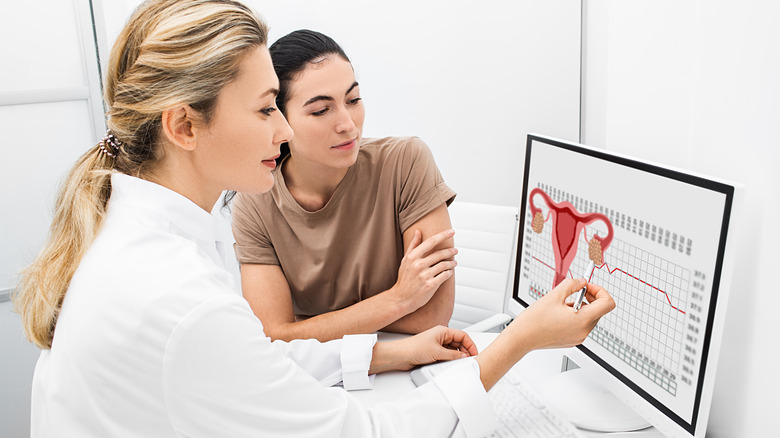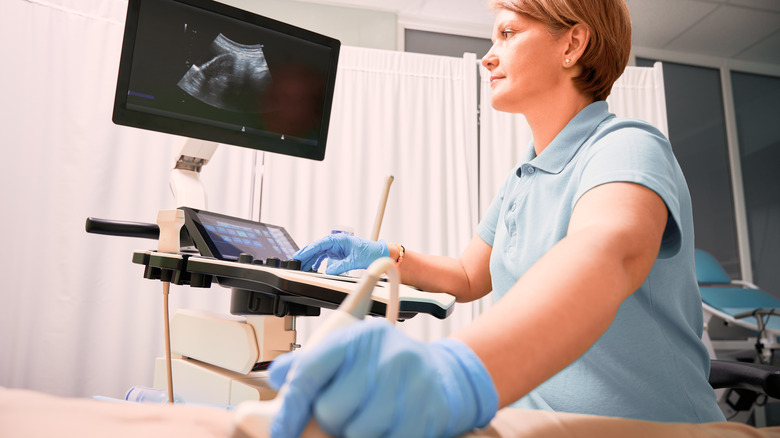Myths To Stop Believing About PCOS
Chances are good that you know someone with polycystic ovary syndrome (PCOS). According to the Centers for Disease Control and Prevention (CDC), it's the most common reason for infertility in women, affecting up to 12% of females of child-bearing age in the United States. Yet, most people know so little about it. In 2019, the National Institutes of Health (NIH) referred to PCOS as "underecognized, underdiagnosed, and understudied," reporting that at least 70 percent of women with the condition don't even know they have it.
It's not only people without the condition who don't understand it. If a woman's primary care provider doesn't recognize the signs and symptoms, how can she be expected to? This lack of knowledge leads many women to suffer in silence, feeling misunderstood and alone, or not getting the right care.
Still, as misunderstood as the condition is, there are a lot of myths surrounding it. Many people think PCOS is some rare condition that only affects overweight women. They think there's a cure: Just lose weight. Even women with PCOS may believe some of the myths, such as they'll definitely get diabetes, or grow unwanted hair, or never be able to have children.
Forget what you've heard — we're about to clear up some of the top myths about PCOS. Whether you think you might have it, you know someone who has it, or you just want to understand it better, here's what you need to know about this common condition.
What is PCOS?
PCOS is the most common endocrine disorder among females of reproductive age. It's caused by a hormonal imbalance — specifically, an excess of androgen, a male sex hormone that is also found in small amounts in females. This can lead to irregular periods and the development of cysts, or small fluid-filled sacs on the ovaries that can interfere with the release of eggs (via the Mayo Clinic).
Females with PCOS are frequently insulin resistant, which means that they are capable of insulin production, but are unable to utilize it correctly (via the CDC). Insulin is a hormone that helps convert food into energy and maintain steady blood sugar levels. Insulin resistance increases a woman's chance of developing type 2 diabetes. PCOS also increases a women's risk of many diseases, including heart disease, high blood pressure, high cholesterol, sleep apnea, and stroke.
There's no known cause of PCOS, although there are factors that increase the risk of developing it, including genetics, bodyweight, and environmental factors. There is also no cure.
Myth #1: Polycystic ovaries and PCOS are the same thing
The name polycystic ovary syndrome is inaccurate. Having PCOS doesn't necessarily mean a woman has polycystic ovaries, and having polycystic ovaries doesn't mean a woman has PCOS (via Alex Polyakov). They are not the same thing. Polycystic ovaries can exist on their own or as part of another condition (like PCOS).
Polycystic ovaries contain an abnormally high amount of partially immature follicles. Ovarian follicles are small sacs on the ovaries, each containing a single egg. The ovaries contain literally thousands of these sacs. During the normal menstrual cycle, these sacs break open and release their eggs to potentially be fertilized by a male's sperm.
Polycystic ovaries are more common than PCOS. More than 30% of women of reproductive age have polycystic ovaries and no additional symptoms. To be diagnosed with PCOS, you must have two or more of the common symptoms, of which polycystic ovaries is one. However, you could have two other symptoms, such as irregular periods and a blood test revealing an excess of androgens, but no polycystic ovaries on an ultrasound.
The biggest difference between the two is that just having polycystic ovaries does not pose any health risks, while having PCOS does. Women with polycystic ovaries may also have fewer problems getting pregnant than women with PCOS.
Myth #2: All women with PCOS are overweight
Although there is no single cause of PCOS, overweight and obesity are thought to be a contributor. However, according to Penn Medicine, the belief that only overweight or obese women develop PCOS is false. It can affect women in any body weight range. A 2019 article in Clinical Medicine Insights: Reproductive Health reported that overweight and obesity occur in 38% to 88% of women with PCOS. That's a fairly wide range, and nowhere near the preconception that all women who have PCOS are overweight or obese.
Strangely enough, where you live may also make a difference. According to a 2007 research review in Obesity Management, studies have reported the incidence of overweight and obesity in women with PCOS to be much higher in the U.S. than in other parts of the world, with rates as low as 20% in other countries. The U.S. has one of the highest rates of overweight and obesity, which may account for the disparity (via the OECD). At least one in four women are likely to be overweight in the U.S., regardless of whether they have PCOS or not.
Myth #3: PCOS can be reversed by losing weight
PCOS isn't reversible, and there is currently no cure. But there are a lot of strategies for managing the condition and leading a normal life. Losing weight is just one of those methods.
While not all women with PCOS are overweight, there is a link between PCOS and overweight and obesity. For those women who are carrying some extra pounds, losing weight can help. Per a 2019 article in Clinical Medicine Insights: Reproductive Health, even a small reduction in weight of about 5% can improve the metabolic, hormonal, and reproductive effects of PCOS.
With that said, it's a double-edged sword. Because the fact is that women with PCOS may have a harder time losing weight than women without the condition. Hormonal imbalances can affect metabolism, including how the body converts food to energy and how it burns and stores fat (via the Better Health Channel). So "just losing weight" isn't as simple as it sounds. Although they may change their diet and activity levels, women with PCOS may still not experience meaningful weight loss, which can be frustrating and disheartening. Patience, self-compassion, and help from medical providers and weight loss specialists can help.
Myth #4: PCOS is solely caused by lifestyle factors
Many people think women get PCOS because of something they did or didn't do. Many women with PCOS blame themselves for their condition. These are inaccurate and harmful myths.
Researchers are still studying the causes for PCOS, but one thing they do know is that genetics plays a role. In fact, according to a 2019 article in The Application of Clinical Genetics, PCOS "is an extremely heterogenetic and complex disease." The authors go on to say that "PCOS is a multifactorial disease and is caused by a number of abnormalities." Any genes and gene mutations that are involved with the ovaries are linked with PCOS.
However, lifestyle choices do contribute to your chances of developing PCOS if you are genetically predisposed to it. If you know you have a family history or a close relative with the condition, taking early action by making healthy lifestyle changes can lower your risk of developing PCOS.
Myth #5: Women with PCOS can't get pregnant
Although PCOS is the most common cause of female infertility, that doesn't mean it's impossible for women with the condition to get pregnant. Fertility issues with PCOS are due to problems with ovulation, which can be treated in various ways.
Lifestyle changes can reduce symptoms and may solve ovulation problems (via Johns Hopkins Medicine). Medications can promote ovulation by helping the ovaries release eggs as they normally would. However, there are risks to these medications, including increased chance of having multiple births. They can also cause overstimulation of the ovaries, leading the ovaries to overproduce hormones. This can cause uncomfortable effects including pelvic pain and abdominal bloating.
Other methods include fertility treatments such as ovulation induction and intrauterine insemination (via illume fertility). In vitro fertilization (IVF) is a more advanced method that may be used if necessary. Consulting with a doctor or specialist knowledgeable about conceiving with PCOS is the best way to determine what options are best for you.
Myth #6: PCOS can be cured
PCOS is a lifelong condition that has no cure, but the condition can be managed with a variety of treatment options.
Lifestyle changes are one part of the treatment for PCOS. Eating a healthy diet that's balanced in calories and includes plenty of fresh fruits and vegetables, lean meats and whole grains can help women with PCOS lose weight. A PCOS diet should be low in sugars and carbohydrates, which can help with insulin resistance and lower the risk of diabetes (via NYU Langone Health). Regular exercise is also key, because it burns calories and builds muscle, which can help control insulin resistance. Exercise can also reduce cholesterol and levels of other hormones, like testosterone.
In addition to lifestyle changes, medications are also often necessary. Birth control pills can help regulate menstrual cycles and lower androgen levels and can also help with other bothersome symptoms, such as acne (via Johns Hopkins Medicine). Diabetes medications are used to help with insulin resistance. They may help lower levels of androgens as well, reduce unwanted hair growth and aid normal ovulation. Other medications can treat symptoms of PCOS, such as acne and hair growth.
Myth #7: PCOS always leads to diabetes
Although insulin resistance is one of the hallmark symptoms of PCOS, that does not mean that all women with the condition will develop diabetes. According to the CDC, over 50% of women with PCOS develop type 2 diabetes by the time they are 40 years old. That means quite a lot of women don't develop diabetes.
If detected and treated early enough, insulin resistance can be managed so it does not progress to diabetes. A proper diet low in sugars and carbohydrates — especially simple carbs that can make your blood sugar spike — is key. Regular exercise is also important. In fact, the American Diabetes Association (ADA) says that exercise can "dramatically" reduce insulin resistance. Cardiovascular exercises such as walking and jogging are a great place to start. You can further reduce insulin resistance by strength training and building muscle. Muscle mass absorbs blood sugar and limits cells' reliance on insulin as a source of energy. This doesn't directly reduce insulin resistance, but it does help women with PCOS who are insulin resistant to better manage their blood sugar levels.
Medications are also an option. There aren't any that specifically treat insulin resistance, but diabetes medications such as metformin can make your body more sensitive to insulin, thus reducing insulin resistance.
Myth #8: PCOS always causes unwanted hair growth
Higher levels of the male hormone androgen causes many women with PCOS to grow hair in places considered abnormal for women. Called hirsutism, the typical locations include the chin and upper lip (via URA). The arms and belly may also be affected.
However, not all women with PCOS develop this symptom. In fact, it's a lot less common than many people would think. According to Fertility Family, about 70% of women with PCOS experience unwanted hair growth. And the degree to which a woman experiences this side effect can vary greatly.
The fact remains that even though it doesn't cause physical pain or discomfort, it's one of the most difficult symptoms for women with PCOS to deal with. It can affect their personal and professional lives, and cause them to lose their sense of femininity and beauty. In a 2014 study examining how women with PCOS experience their condition, many reported feeling shame, humiliation, weakness, abnormality, and inferiority to their peers, very often related to unwanted hair growth.
The good news is that there are effective treatments, and it's not something women with PCOS just have to live with. For women who aren't trying to conceive, birth control medication can help regulate hormone levels (via ReproductiveFacts.org). A diuretic called spironolactone is frequently prescribed along with birth control with good results. Cosmetic treatments are also an option, with waxing, bleaching, electrolysis, and laser hair removal widely accessible and effective.
Myth #9: Women with an irregular menstrual cycle have PCOS
Irregular periods — either too long, too short, or non-existent — are one of three common signs of PCOS, in addition to increased androgens and polycystic ovaries. Although PCOS is the most common cause, having irregular menses does not mean you have PCOS (via Fertility Centers of New England). PCOS is just one of many conditions that can cause irregular periods.
Hormonal changes in levels of estrogen and progesterone can cause irregular periods at different times in your life (NHS Inform). During puberty, pregnancy, childbirth, breastfeeding, and menopause, levels of these hormones can fluctuate and causes changes in your menstrual cycle. Irregular periods may be especially common prior to menopause.
Other factors that can affect your period include stress, weight gain, eating disorders, using hormonal contraception, and extreme exercise regimens. Some underlying health conditions, aside from PCOS, can be the cause. This includes endometriosis, pelvic inflammatory disease, fibroids, and adenomyosis.
Don't jump to conclusions. If you're not pregnant and you haven't had a period in three months or have periods that are closer or farther apart, see your doctor.
Myth #10: There's one test for diagnosing PCOS
If only it were that simple. In fact, many women with PCOS go years without a diagnosis, because the condition is so complicated to diagnose — and as the NIH reported, frequently understudied and underecognized. Women often address single symptoms without understanding that they are connected, or without receiving the proper diagnosis from their primary care provider that allows them to deal with PCOS as a whole, rather than as a collection of separate issues (via Health.mil).
Receiving a diagnosis of PCOS first begins with a discussion with your doctor about symptoms, family history, medications you're taking, or other medical conditions you have that may be contributing to your symptoms. Your doctor will likely ask about your menstrual cycles and any changes in weight. A physical exam can help identify abnormal hair growth, insulin resistance, and acne. Following that, your provider may order additional tests, including bloodwork, a pelvic examination, and an ultrasound. In order to receive a PCOS diagnosis, you must meet two out of three criteria: irregular menstruation, signs of or a blood test confirming increased levels of androgens, or polycystic ovaries (via NYU Langone Health).
Myth #11: PCOS only matters if you're trying to get pregnant
Infertility isn't the only reason to worry about PCOS. For starters, having PCOS increases your risks of developing diabetes. Diabetes has wide-ranging affects on multiple systems throughout the body and can exponentially increase the risk of complications and serious diseases, including heart and blood vessel disease, nerve damage in your extremities, kidney disease, sleep apnea, impaired hearing, skin conditions, eye damage, delayed wound healing, and dementia (via the Mayo Clinic). If left untreated, PCOS can pose other health risks, including abnormalities in cholesterol and blood fats, heart disease, heart attack, stroke, and endometrial cancer (via the Better Health Channel).
Many people think that PCOS just goes away after the child-bearing years are over, but that is incorrect. PCOS is a lifelong condition that can last into menopause and beyond (via the NIH). In fact, the inflammatory and metabolic effects may get worse after menopause and increase the risk of older women with PCOS developing heart disease, high blood pressure, and type 2 diabetes. Therefore, lifelong treatment, lifestyle changes, and monitoring from medical professionals is required.













